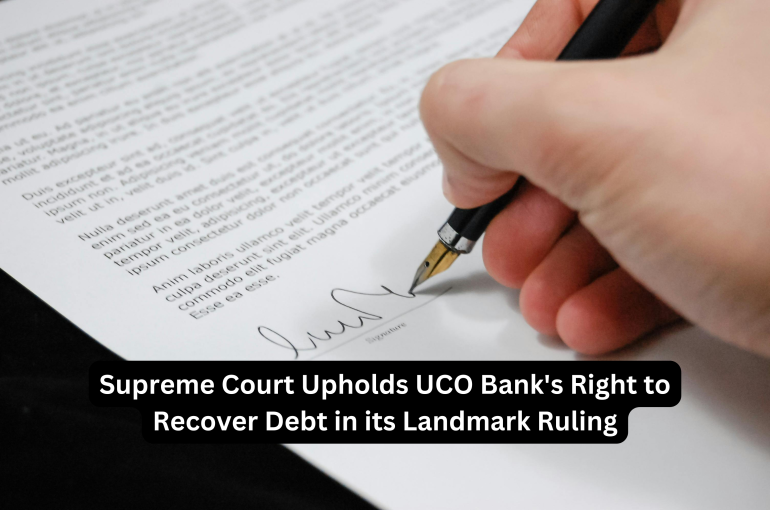Supreme Court Upholds UCO Bank’s Right to Recover Debt in its Landmark Ruling
The case of Vidyasagar Prasad v. UCO Bank & Anr., [CIVIL APPEAL No. 1031 of 2022], decided by the Supreme Court of India (Division Bench), addresses a critical issue under insolvency law related to the initiation of the Corporate Insolvency Resolution Process (CIRP) under Section 7 of the Insolvency and Bankruptcy Code, 2016 (IBC). The primary question revolved around whether an acknowledgment of debt within the Corporate Debtor’s balance sheets and a One-Time Settlement (OTS) proposal could extend the limitation period for initiating CIRP, thereby making the claim by UCO Bank timely and valid.
Facts
The Corporate Debtor (represented by the suspended director, Vidyasagar Prasad) availed a loan from UCO Bank to finance its thermal power plant operations. However, after defaulting on the repayment of both principal and interest, the Corporate Debtor’s account was declared a Non-Performing Asset (NPA) on November 5, 2014.
Subsequently, UCO Bank initiated actions under the SARFAESI Act and DRT to recover dues, though these actions were not directly relevant to the current appeal.
On February 13, 2019, UCO Bank filed an Application under Section 7 of the IBC to initiate CIRP against the Corporate Debtor.
The Corporate Debtor contested this Application, claiming it was barred by limitation and disputing the competence of the bank’s representative to file the Application.
Key Issues and Arguments
- Limitation and Acknowledgment of Debt:
The debtor argued that the Application under Section 7 was barred by the limitation period, which started on November 5, 2014 (date of NPA classification). Thus, the filing in February 2019 was beyond the three-year limit prescribed by Article 137 of the Limitation Act.
They further argued that no clear or unequivocal acknowledgment of debt was present in the balance sheets to extend the limitation period.
UCO Bank’s Argument:
UCO Bank contended that the debt was acknowledged in the Corporate Debtor’s financial statements as of March 31, 2017, and the balance sheet note reflected continuing default. This acknowledgment, they argued, was sufficient to extend the limitation period under Section 18 of the Limitation Act.
They also cited the debtor’s OTS proposal as further acknowledgment of debt.
- The Corporate Debtor challenged the filing on grounds that the bank’s General Manager was not competent to sign the Application. The Adjudicating Authority dismissed this argument, confirming the General Manager’s authority under a power of attorney.
Lower Courts’ Findings
The Adjudicating Authority NCLT and the NCLAT dismissed the debtor’s objections:
Existence of Debt: Both Authorities found that a valid debt existed, as documented in the Loan Agreement and acknowledged in Balance Sheets and Credit Agreements.
Acknowledgment of Debt: The Balance Sheets were found to constitute acknowledgment under Section 18 of the Limitation Act, thereby extending the limitation period.
Proposal for One-Time Settlement: This was taken as a clear indication of subsisting liability and acknowledgment of debt.
Supreme Court’s Analysis
The Supreme Court, upholding the findings of the lower tribunals, analyzed the Application of Section 18 of the Limitation Act within the IBC framework, considering several landmark judgments.
- Applicability of Section 18 of the Limitation Act:
The Court reaffirmed that with the enactment of Section 238A, the provisions of the Limitation Act apply to IBC proceedings. Section 18 of the Limitation Act, which allows the limitation period to be extended upon acknowledgment of debt, is therefore applicable.
Referring to Laxmi Pat Surana v. Union Bank of India and Dena Bank v. C. Shivakumar Reddy, the Court underscored that acknowledgment of debt can occur through entries in books of accounts and balance sheets, which constitute valid acknowledgment for extending limitation.
- Balance Sheets as Acknowledgment of Debt:
The Court cited Asset Reconstruction Company (India) Ltd. v. Bishal Jaiswal [(2021) 6 SCC 366], wherein it was held that mandatory financial statements, such as balance sheets, can constitute an acknowledgment of debt, provided there is no express disclaimer regarding liability.
In the present case, the Court noted that the balance sheet contained entries indicating default on long-term borrowings and an explicit note from the auditor on the Corporate Debtor’s default. The Court found this acknowledgment to be unequivocal, allowing the limitation period to restart.
- One-Time Settlement Proposal:
The Court reasoned that the Corporate Debtor’s OTS proposal to UCO Bank, dated June 7, 2016, served as additional acknowledgment of liability. Referring to Lakshmirattan Cotton Mills Co. Ltd. v. Aluminium Corporation of India Ltd. [(1971) 1 SCC 67], the Court emphasized that acknowledgment need not specify the debt’s exact nature; it suffices to reflect an ongoing debtor-creditor relationship.
Conclusion and Implications
The Supreme Court ultimately upheld the Orders of the NCLT and NCLAT, affirming the initiation of CIRP against the Corporate Debtor. Key takeaways include:
The judgment reinforces that balance sheet entries can serve as acknowledgment under Section 18 of the Limitation Act, extending the limitation period.
The judgment clarifies that the Limitation Act provisions, including Section 18, apply to IBC cases. This is crucial for creditors, as acknowledgment in financial statements can renew limitation periods, allowing them additional time to initiate CIRP.
The Court underlined that OTS offers constitute acknowledgment, which strengthens creditors’ ability to argue for extended limitation based on debtors’ communications.
This judgment is a landmark case for insolvency law, shaping the understanding of debt acknowledgment under IBC. It provides guidance on balancing statutory requirements with the practical realities of corporate debt, supporting creditors’ rights to pursue resolution within extended limitation periods based on documented acknowledgments by debtors.
Shikha
Associate
The Indian Lawyer & Allied Services





































Leave a Reply